春节对于中国人来说是最重要的节日。在每年的春节都让人兴高采烈,尤其是大年三十那晚,更是达到了高潮。
现在我们来谈谈春节的习俗。
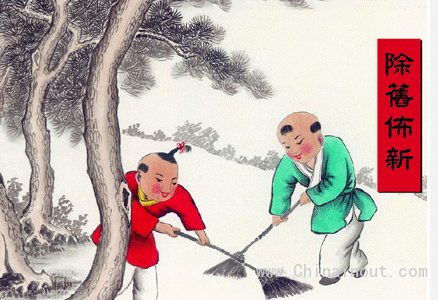
扫尘
在中国“尘”与“陈”谐音,新春扫尘有除尘布新之含义,其用意是要把一年的穷运、晦气统统扫出门,以迎接新生活的美好愿望。总之,春节来到之前,家家户户都会彻底打扫房屋,迎接新年的到来。
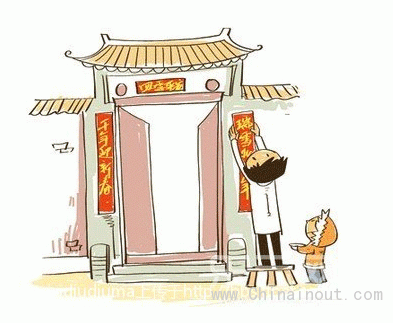
贴春联
“春联”,也叫“对联”和“对子”,工整,对偶,简介,精巧,是中国文学的一种特殊形式。春节前夕,家家户户都会在门上贴春联,烘托节日气氛。在过去,中国人通常自己写春联或者让别人代劳,而今,都是在市场上买春联。
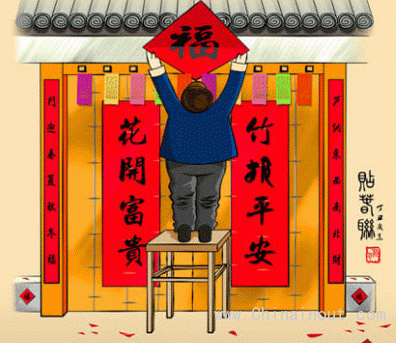
贴窗花和“福”字
剪纸,通常是吉祥图案,更是给节日增添了幸福的气氛,表达中国人民对未来生活的美好祝愿。除了粘贴在窗户上,剪纸还可以黏贴在墙壁上,周围的房子的门和门框上。 “福(福)”表达了人们走向美好生活的向往。有些人甚至吧福字倒过来,以表示祝福已经来临,因为“倒”和“到”谐音。春节前市场上会有很多剪纸“福”字。
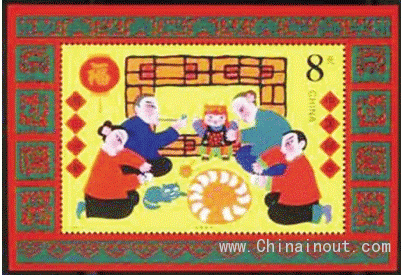
守岁
守岁源于一个有趣的民间传说。古时有一个叫做“年”的怪兽,非常凶猛。“年”总是在新年的时候从洞穴出去吃人。因此,每到除夕,家家户户都会坐在一起吃晚饭。晚饭后,谁都不敢睡觉,所有的家庭成员将坐在一起,聊天,彼此打气。慢慢的出息守岁的习惯就形成了。因此,在中国,“庆祝春节”也被称为“过年”。不过,现在城市中守岁的人越来越少了。
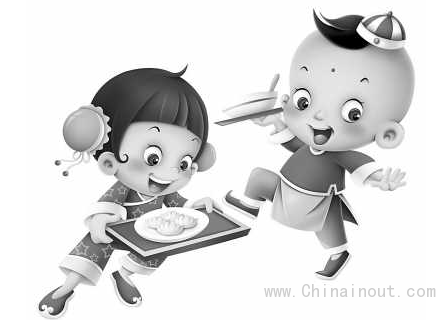
吃饺子
除夕夜,全家人会坐在一起吃饺子,庆祝春节。饺子像中国古代的元宝,象征着金钱和财富。吃饺子的传统在中国很重要。要是没有吃饺子,春节就不完整。
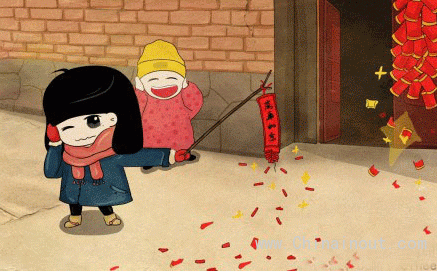
放鞭炮
爆竹是中国特有的产物。在中国古代,爆竹声是用来吓跑野兽和恶鬼的。火药的发明后,爆竹也被称为“鞭炮”(“炮”在中国是指枪),用于烘托欢乐气氛。每一个中国家庭做的第一件事就是燃放烟花爆竹,告别旧岁,迎接新年。
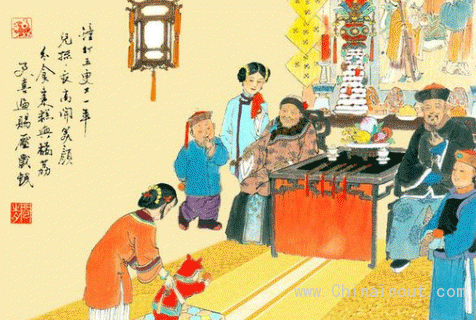
拜年和压岁钱
在中国农历年的第一天,大家都穿上自己最好的衣服,去拜访新朋好友,送去对他们的美好祝福。通常是,晚辈给长辈拜年,祝愿长辈健康长寿,而长辈会给晚辈一些压岁钱,希望晚辈平平安安。(中国进出口网)
Spring Festival is the most important holiday for Chinese people. Excitement and happiness are palpable this time of the year, and they reach the peak on lunar new year's eve.
Spring Festival is the most important holiday for Chinese people. Excitement and happiness are palpable this time of the year, and they reach the peak on lunar new year's eve.
Now we are talking about the customs of the Spring Festival.
Sweeping the Dust
“Dust” is homophonic with “chen”(尘)in Chinese, which means old and past. In this way, “sweeping the dust” before the Spring Festival means a thorough cleaning of houses to sweep away bad luck in the past year. This custom shows a good wish of putting away old things to welcome a new life. In a word, just before the Spring Festival comes, every household will give a thorough cleaning to bid farewell to the old year and usher in the new.
Pasting Spring Couplets
“The Spring Couplet”, also called “couplet” and “a pair of antithetical phrases”, is a special form of literature in China. The Spring Couplet is composed of two antithetical sentences on both sides of the door and a horizontal scroll bearing an inscription, usually an auspicious phrase, above the gate. The sentence pasting on the right side of the door is called the first line of the couplet and the one on the left the second line. On the eve of the Spring Festival, every household will paste on doors a spring couplet written on red paper to give a happy and prosperous atmosphere of the Festival. In the past, the Chinese usually wrote their own spring couplet with a brush or asked others to do for them, while nowadays, it is common for people to buy the printed spring couplet in the market.
Pasting Paper-cuts and “Up-sided Fu”
Paper-cuts, usually with auspicious patterns, give a happy and prosperous atmosphere of the Festival and express the good wishes of Chinese people looking forward to a good life. In addition to pasting paper-cuts on windows, it is common for Chinese to paste the character “fu(福)”, big and small, on walls, doors and doorposts around the houses. “Fu(福)” shows people’s yearning toward a good life. Some people even invert the character “fu(福)” to signify that blessing has arrived because “inverted” is a homonym for “arrive” in Chinese. Now many kinds of paper-cuts and “fu(福)” can be seen in the market before the Festival.
Staying Up Late on New Year's Eve
The tradition of staying up late to see New Year in originated from an interesting folk tale. In ancient China there lived a monster named Year, who was very ferocious. Year always went out from its burrow on New Year’s Eve to devour people. Therefore, on every New Year’s Eve, every household would have supper together. After dinner, no one dared go to sleep and all the family members would sit together, chatting and emboldening each other. Gradually the habit of staying up late on New Year’s Eve is formed. Thus in China, “celebrating the Spring Festival” is also called “passing over the year (guo nian)”. However, now there are less and less people in cities who will stay up late to see New Year in.
Having Jiaozi
On New Year’s Eve, the whole family will sit together to make jiaozi and celebrate the Spring Festival. The shape of jiaozi is like gold ingot from ancient China. So people eat them and wish for money and treasure. The tradition of having jiaozi is very important during the Spring Festival. You cannot have a complete Spring Festival without having jiaozi.
Setting off Firecrackers
The firecracker is a unique product in China. In ancient China, the sound of burning bamboo tubes was used to scare away wild animals and evil spirits. With the invention of the gunpowder, “firecracker” is also called “鞭炮biānpào” (“炮” in Chinese means gun) and used to foster a joyful atmosphere. The first thing every Chinese household does is to set off firecrackers and fireworks, which are meant to bid farewell to the old year and usher in the new.
New Year's Visit and Gift Money
On the first day of the Chinese lunar year, everybody puts on their best clothes and pays ceremonial calls on their relatives and friends, wishing them all the luck in the coming year. Juniors will greet seniors, wishing them health and longevity, while seniors will give juniors some gift money as a wish for their safety in the coming year.
Traditional Festival Greetings:
恭贺新禧 | Happy New Year
吉祥如意 | Everything Goes Well
恭喜发财 | Wishing You Prosperity
年年有余 | Surplus Year after Year
岁岁平安 | Peace All Year Round
新春大吉 | Good Luck in the New Year











